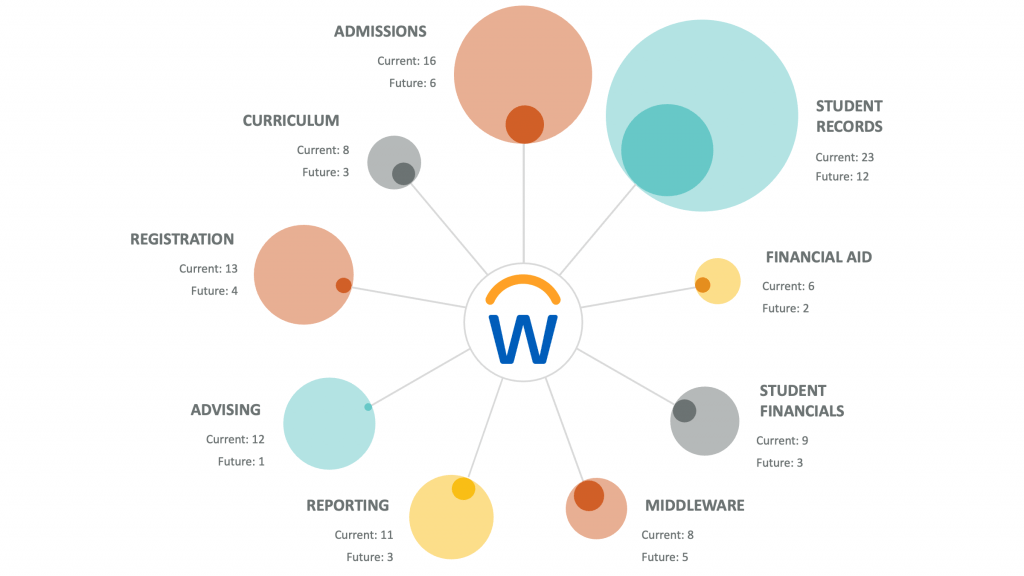October 4 marked the official start of the design of our new student information system – Workday Student – which is the initiative at the heart of the Student Sunrise project. It also closes out nearly two years of discovery and planning work completed to understand our current academic operations and lay a foundation for a successful project.
“I have been very impressed by both the amount and quality of work that has been accomplished,” says Beverly Wendland, provost and executive sponsor for the Student Sunrise project. “From the opportunities gleaned from the academic process transformation work to the progress with the Graduate Admissions Systems project, the Student Sunrise project team has seen great results in the Plan Stage.”

During the next implementation stage, called Architect, Configure & Prototype (ACP), the project team will design Workday’s Student system for WashU. The ACP Stage will be completed in four chunks called worksets, concluding in September 2023 when the project begins a year-long testing stage. Because the systems run on the same platform, our design for Workday Student will build off the university’s configuration of Workday HCM and Finance which launched earlier this summer.
Engaging campus teams
While the Student Sunrise team is responsible for most decisions and project work, the project needs to engage subject matter experts from across the university to be successful.
The Student Sunrise steering committee and functional leads have established five campus teams aligned to the five Workday functional areas to help ensure that the diverse interests of our community are represented in decision making. The campus teams are composed of experts from the schools and academic units most impacted by Student Sunrise and will be engaged for the life of the project. View participants by campus team and by school/unit.
Campus team members will play two critical roles to help build and launch Workday. The first is by providing input into how the system is configured. Through monthly meetings, campus teams will offer insight into how we do things today, how we’d like to do things in the future, and how we can leverage Workday to meet our needs. Participants will help define system requirements, design unified processes, provide feedback on project decisions, and test the system.
Another important role that campus team members will play is to help their school or unit adopt Workday and any changes resulting from the project and to prepare for go-live. As the project team identifies what’s changing at a high level, they will partner with campus team members to understand how changes will impact each school or unit and identify the best ways to communicate about them. Campus team members also will support the steering committee in sharing news about the project with their area and bringing any questions or concerns that their area may have to the attention of the project team.
“The work that our campus teams will be doing through Student Sunrise has a direct impact on our ability to fulfill the project’s mission and implement our strategic plan. This is not only about replacing an aging student information system, but also fulfilling our academic strategy.”
Provost Beverly Wendland
In addition to campus teams, there are several ways that members of the campus community will participate in future project activities, including testing, training development and other readiness activities. Interested in getting involved? Let us know through this form.
Sharing data across systems and moving data to Workday
During the project’s Discovery Phase, the Student Sunrise team completed an inventory of all the systems we use to support academic and student operations today. Many of these systems will be replaced by Workday Student. In fact, through Student Sunrise, we are moving from ~109 core academic systems to ~39.
Student Systems Environment: Current to Future State

As we retire current systems, we need to move some of their data to Workday. This process, known as data conversion, will be ongoing until we are fully live in Workday Student in 2025. We successfully loaded data from SIS into Workday during the project’s Plan Stage. During the ACP Stage, the project team will engage members of campus to regularly verify that the data in Workday accurately reflects what’s in our current systems. Similar to the campus teams, these data verifiers will be engaged for the life of the project to ensure a smooth transition to Workday.
Other university systems need to send and receive data from Workday. For instance, Slate will send information to Workday when an admitted student matriculates to create their student record in Workday. These connections between systems, known as integrations, are essential to completing core academic and student processes. During the ACP Stage, the project team will partner with systems owners and the IT leaders in the schools and academic units to identify integrations requirements and begin building integrations that are required to turn on Workday. We’ll share more about the project’s integrations work on the website as well as in upcoming issues of Sunrise Spotlight.